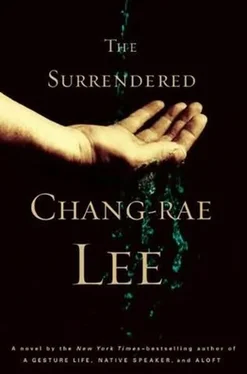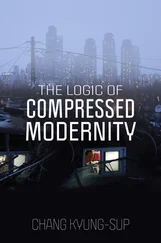As he scrubbed his forearms and chest and legs with the bar of green laundry soap he wondered if Min was crying again in pain in the back of the taxi, or else gone that ill shade of gray. The thought of a small coffin being lowered into a hole at the orphanage graveyard made him shiver. It was a grave that he should have to dig, but he was sure he couldn’t do it; he’d dug scores of graves during the war, and a few afterward, but he couldn’t bear to dig this one. His flanks were smudged with dried blood and he scrubbed them harshly until they were raw, doing the same everywhere else the boy had marked him with blood, now using an old hairbrush (as he had learned to do after a long day of handling bodies after a battle) against his skin until the last of the water ran out. As he reached for the towel he caught a flash of reflected light disappearing around the corner. He thought at first it had been a falling leaf or a bird but there on the ground was his torn, blood-soaked shirt. He peered around the building and saw the children running and playing in the central yard of the compound and the aunties observing them from the shade of their lean-to but then just beyond them the new reverend’s wife stepping quickly up the stoop of Hong’s cottage.
The rest of the afternoon he worked, waiting for Reverend Tanner to return with Min. He stacked the kindling and filled five-gallon water cans from the well and ferried them in twos to the dormitories and the women in the kitchen; from around the buildings he cleared high weeds and dead leaves and brush, to lessen the fire danger; he patched a leaky spot in the dormitory roof; and he began digging a deep, narrow trench for a permanent run of pipe that would finally connect the outhouse to a small pond-sized cesspool he’d been digging for the last month. The water plumbing was already in. By the time dusk fell he had trenched five meters (it was in fact a lot, given the hard-packed, rocky soil), and the children were eating their supper at the tables outside with the kitchen aunties. He asked one of the aunties if the new reverend’s wife had come out yet from the cottage and she shook her head and mumbled something that he didn’t understand. He had learned enough Korean for basic communication but could rarely comprehend past the first phrase. He asked her to repeat herself and she said it was no matter, saying the woman was probably tired and that he should not bother her. He said he wouldn’t bother her, but the auntie drifted away without hearing him. She and the other aunties liked him well enough and certainly appreciated his help fetching firewood and water, but he’d always sensed that their enthusiasm for him was limited, that they’d learned certain lessons from the war and that he, as a former GI, could only ever be provisionally trusted. If anything, they’d warmed to him because of Reverend Hong’s obviously sanguine feelings for him, which was another reason why he thought he should be leaving now. But he never finished packing his satchel, instead emptying it and hanging it up over the exposed rafter, his guilt over Min at least the primary reason, though he kept checking the cottage door from wherever he was working for any sign of her.
When night fell, candlelight briefly illuminated the front window of the cottage. Hector was sitting out front of the supply room, leaning back against the support post on a cut-down stool, drinking steadily from a bottle of warm whiskey. Reverend Tanner and Min had still not returned. The candlelight went out and for the rest of the bottle he waited for the panes to be lit again, to catch a glimpse of her moving through the rooms. But there was nothing. The more he drank the more restless he grew, his limbs bristling with the inaction, aching to push back against the calm. He got the Willys to start and drove it fast into Itaewon, his knuckles alive with anticipation. He went to a bar where no one would know him and proceeded on his typical late-night program, his modus bibendi (as his father, Jackie, liked to say), casually winning enough money in drinking contests (the first always leading to another, and another) to more than pay for his tab at night’s end. But one of his earlier opponents, a thick-lipped, sour-faced sergeant who watched him submerge all comers, decided he was a trickster or a hustler and called him out as he left, and Hector, wide-eyed as a full moon, let the drunken, angry sergeant swing wildly at him before stepping in close to trade blows. Without any grappling or pushing they struck each other, locked toe to toe, for a good three minutes. The man had surprising strength but he soon flagged, and then the contest tipped, as it always did. It was cruel of Hector, surely, for he knew it would have to come to this, the sergeant soon just another ambulant dreamer, held up only by the alley wall, his thick lips split top and bottom and petaled out horribly into four. Hector’s last blow was simply to nudge him sideways, the man crumpling down slowly to the gutter, set forth now on that bruised, booze-soaked slumber that never quite mollifies.
Hector went on to a rooming house where the proprietress knew to have two women from the adjoining brothel sent to his room. It was how he preferred it, never hiring just one if he could afford two, a satisfaction and habit that had grown out of those first ministrations with his older sister’s girlfriends, though on this night it was a craving not so much libidinous as a want of continuous labors, an intense need for usage on his body. But when they stripped for him he could see they were girls, and young ones-hardly sixteen, if that-and rather than send them back down to someone else, he just had them lie with him in the bed. It was four a.m. and they were tired, too. He had not been so valiant in the past but his heart was sodden with the unhappy sights of the day, and though he had no desire to go home to the States he realized he ought to leave Korea soon. It was true he had little sentiment left for his ex-comrades-he could bait any poor bastard like the sergeant into a harsh and probably undeserved realm of pain-but seeing for three long years these destitute people and their children serve as handmaidens in their own wrecked house had finally begun to vanquish him. It had not seemed a problem at first, for it was nothing compared to what he had witnessed in the war, but he sensed that he was being replaced, cell by cell, with bits of stone. Even in regard to Min his guilt was as much conception as feeling. And he still wanted that feeling, at least for the natives. In the morning the girls stood above him in their too-colorful dresses and the older one politely asked him if he would pay them extra for staying the night, which he did, knowing that they would otherwise get docked of their pay, or even beaten.
When Hector got back to the orphanage in mid-morning, Reverend Tanner was conducting the Sunday service beneath the pavilion in the central yard; it was where everyone gathered and ate in the warm weather. He parked the Willys in its spot just inside the arched gate and walked in. They were singing a minor-key hymn and his heart sank in fear that they were doing so for Min, but then he spotted a pair of crutches at the end of the front row, Min sitting up straight and bright-faced, his mouth wide with song. His foot was heavily bandaged. Tanner’s wife sat next to him, focused intently on her husband at the head of the congregation, singing, too, with the enthusiasm of a preacher’s wife.
When they were done, Tanner addressed them. He was very much at ease and spoke Korean quite well, as he’d worked in Pusan the last year of the war. He had told them, as Hong had before, how he had come to oversee the orphanage as well as tour the many other church-affiliated orphanages around the country, to observe conditions and allocate resources as well as to teach classes, and also, of course, arrange for adoptions. But then he was humorous in recounting what had happened on coming back from the hospital, telling how Min somehow convinced the taxi driver to let him take the wheel for a little bit, which nearly led to their skidding off the road. There was a hearty laugh and Tanner prompted Min, who hopped up on his crutches, grinning and waving his hands, and then took a deep bow. There was rousing applause and shouting and anyone could see that Tanner had already begun to win them over. He continued, not with a Bible lesson but with a talk about his background as a physician and how he had come to his faith after his own miraculous recovery from an otherwise fatal blood poisoning.
Читать дальше











